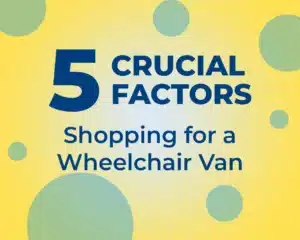This year’s Olympic Games have come and gone, but the competition and excitement isn’t over yet. The 2016 Paralympic Games in Rio begin Sept. 7, and despite the strong critiques of Rio’s unpreparedness for such games, we know Team USA is going to enter the arena ready to win the gold no matter what.
How do we know this?
A few weeks ago Vantage Mobility interviewed Christina Schwab and Steve Serio, the team captains for the women’s and men’s wheelchair basketball teams, respectively. This year won’t be Schwab and Serio’s first time to the Paralympics — for Schwab, this will be her sixth, including four times for basketball and once in London for track, and for Serio, his third.
Both captains were confident their teams had the training, motivation and camaraderie to defeat the opposing countries’ most skilled paralympic athletes.
Q&A with Christina Schwab and Steve Serio
When did you get into basketball, and when did you decide to train to be a professional?
CS: I played basketball when I was 11 years old in the junior division, and I started playing for a women’s team when I was about 14. By the time I was 15, I was asked to go to a bunch of Team USA developmental (events), so I would say when I was 15 I started really focusing on basketball. I became an alternate for the ‘96 Paralympic Team. I didn’t go to those games, but I was an alternate, so that was kind of what triggered me and got me really focused on the sport.
SS: I had my spinal cord injury accident when I was 11 months old, so I’ve been paralyzed for almost my whole life. Growing up, I had my able-bodied friends; I played able-bodied sports. I … didn’t know anything about the adaptive sports world until I got to high school and my local school basically told me that I wasn’t allowed to play sports with my friends anymore. There was an injury risk for me and for them, so they basically told me I had to go the manager route if I wanted to be involved. I was looking for an athletic outlet (and) there just happened to be a (wheelchair) basketball team 10 minutes away from where I grew up. I went down one day and never left.
Would you mind explaining your disability?
CS: I was born with spina bifida. So I’m a T12, L1 paraplegic.
SS: I was born with a benign spinal tumor that went misdiagnosed when I was a baby, and … it became infected and inflamed. Basically, it severed my spinal cord. It’s just like another spinal cord injury. I’m basically paralyzed from the knees down.
What do you tell yourself to push through a tough game or practice?
CS: I’m pretty self motivated, but as I get older, I’m pretty motivated right now with the olympics on… I know that I’m representing my team, my country, my family and everybody who’s gotten me to this point. I can’t let them down. They want to see me succeed, and I want to succeed for them. Especially right now I know that my 11 other teammates are working just as hard as I am, so I know I got to get through this workout so I can be the best athlete I can be for the team.
SS: The beauty of a team sport is you have other people to fight for. If there’s a training session that I personally feel I’m too tired for, or I get tired in the game, I kind of just think to myself that I’m not just fighting for myself. I’m fighting for these 11 other guys that are on my team who are relying on me to perform, and that usually gets me through any fatigue.
You both have been to the Paralympics before. As captains, what makes this year’s teams special or different?
CS: I think every year you have something special about the team, and it changes from game to game. You can never recreate what there was in the past. There’s different personnel, different personalities; different strengths and weaknesses. For me … I’ve taken on a leadership role in the past, but now I’m a co-captain. I’m the oldest one on a team. We have a pretty young squad, and they look to me for experience and guidance…I have to be that role model and work hard so I can be that example for everybody… But the team (is) just so unique because everybody on this team, they’re all friends. I think that’s important for this group of girls… (With) this team, if something arises, we squash it. We know we’re here for the greater good. We’re here for one goal in mind: that gold medal. And we’re better every time we get together.
SS: In the previous Paralympics, we’ve had really talented teams, we just hadn’t figured out a way to put it all together and enhance everyone’s strengths and play our best. The best thing about this team is our camaraderie and our closeness. We all fight for each other, (and) we all get along really well on and off the court. We have this really unique ability to push ourselves extremely hard during workouts and really battle each other, and then on the court, be each other’s best friends and let it go. We’ve become a really close team. I think that’s the difference.
Besides winning, do you have any other goals for the Paralympic Games this year?
CS: My overall goal is to take it all in and enjoy it because I know this is my last one as an athlete. I just want to experience things with these girls and have it be the best experience that it can be.
SS: To just make every Paralympic experience special. Some of the guys only get one opportunity, and … this will be my third. I want to make it as memorable as possible. I treasure walking into the opening ceremonies arena. I love playing in front of all those people and playing at the highest level… (Also), when I was growing up, I was inspired by players like Paul Schulte and Patrick Anderson; they set a great example, not only in winning Paralympic medals, but also in how they conducted themselves off the court. To wear those three letters across your chest, USA, is a completely unique experience that is just once in a lifetime. I hope we can set a good example on and off the court and inspire the younger generation to work hard and accomplish their dreams.
Finally, do you think your teams have what it takes to win?
CS: Absolutely. I think we have everything in our little piece of the puzzle that you can put together for a gold medal team.
SS: Absolutely. We have a great mix of talent with the young guys who’ve never been there before and then some older veterans who know what to expect. (They) can help our young guys through some of the ups and downs. Like I said, this is one of the closest teams I’ve ever been on. When you combine having a lot of talent with all the camaraderie that we have within our team, I think it’s a recipe for success.


















